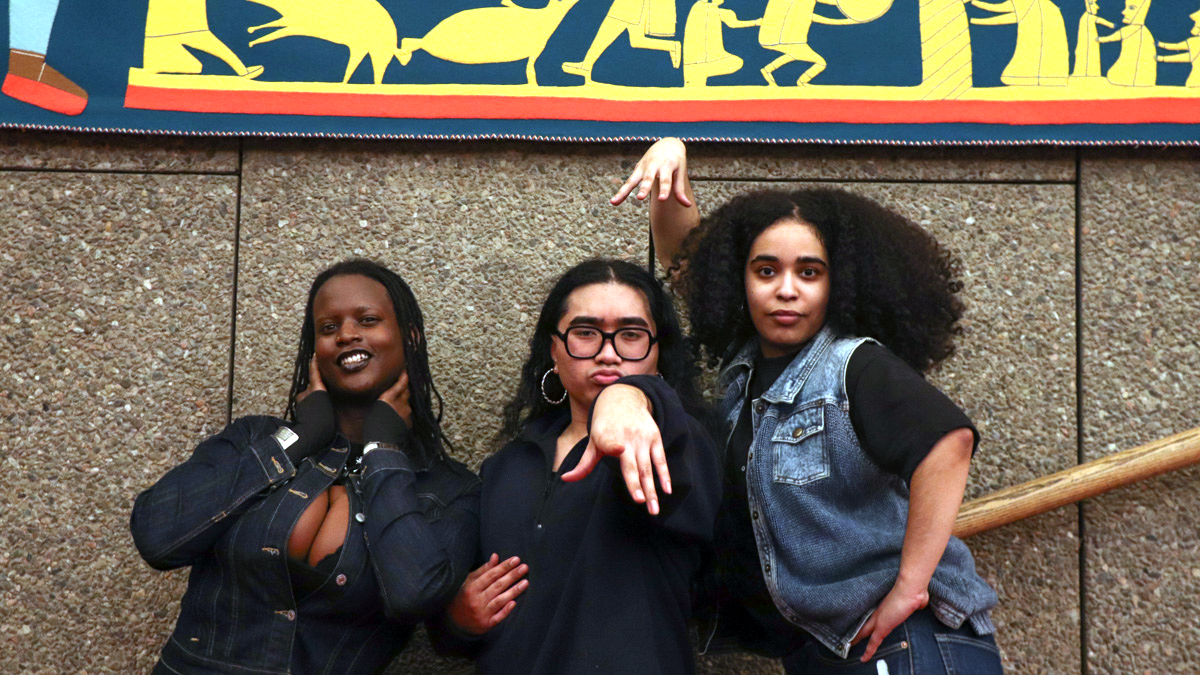For Zineb Allaoui, being part of the queer ballroom scene has been instrumental in helping her find a sense of belonging in Ottawa.
After emigrating from Morocco five years ago, Allaoui said finding the Kiki Ballroom scene allowed her to express her queerness in a way she couldn’t back home.
Every Monday, Allaoui walks through the doors of the NAC and her worries about the outside world are muffled. She’s entering the world created by Touch Grass, a group she co-founded, excited to connect with other members of the racialized queer community.
The music starts, and attendees take to the floor. Amidst the cheers of their friends, dancers begin “voguing,” strutting and dipping to the beat. Using their hands and arms, they create sharp geometric lines, mime putting on makeup or frame their faces.
Serving face, body and the community, Touch Grass is helping racialized LGBTQ+ youth find a sense of belonging. Allaoui founded the informal ballroom group with her friends Jerry Nyana Ntwari and KC Gagatiga. These three aim breathe life into Ottawa’ burgeoning Kiki ballroom scene and connect performers to the subculture’s political roots.
Allaoui first got involved in ballroom when she attended a voguing class two years ago. Vogue, a dance style born in 1960s gay culture in Harlem, was inspired by the popular fashion magazine.
While many equate the ballroom scene with vogue dance battles held at large events called balls, many people also showcase their fashion, runway and makeup skills. Most importantly, the subculture provides a venue for queer people, especially racialized queer people, to be who they are.
In Ottawa, the ballroom scene is relatively young. The Cap City Kiki Ballroom Alliance was founded in 2020. Outside of this alliance, organized ballroom groups remain scarce.
“We didn’t realize the importance of the space we created until we started hearing feedback from people,” Allaoui said. “They feel like it’s their first time in Ottawa where both their queerness and being a person of colour are celebrated equally.”
Ntwari, one of the co-founders of Touch Grass, said ballroom is a shield against hate, which is especially needed now given the current hostility against LGBTQ+ people.
“[Touch Grass] can be a literal shelter, or it can also be a space for people to just come and share experiences.”
Touch Grass has already garnered loyal support. After starting in the fall of 2024, the group moved from practicing in parks to booking space at the NAC over the course of a few months.
“Ballroom is a space where queer people can feel like stars and celebrities,” Allaoui said.
Annual statistics from the Ottawa Police Service’s Hate and Bias Crime Unit show reported hate crimes against LGBTQ+ people have been rising between 2018 and 2023.
“The only reason that we are being oppressed and bullied like this is because the people who make the rules are more organized than us,” said KC Gagatiga, the third founder of Touch Grass. “So, this space is meant to solve the immediate issue of having community. But in the long term, the goal is to really build political power among people who share the same identities.”
Caprice Esmas, a community organizer and peer support worker with the Ottawa Youth Services Bureau, said threats to racialized queer youth are heightening and building strong bastions of community is an urgent task.
Esmas pointed to U.S. President Donald Trump’s decision to repeal executive orders in January, including one promoting LGBTQ+ people’s rights to education and employment free from discrimination. They also highlighted an Alberta bill passed in December which will require children under 16 to have parental consent if they want to change their names or pronouns at school.
“More conservative governments might see what Trump does and be emboldened to believe that they can do it here,” Esmas said. “We are already going to have a federal election sometime this year. … So, we are in an extremely unstable place.”
Esmas said they hope more people turn to community as a solution to the oppression facing racialized trans and queer people. Trans and queer safety is better sustained when it is coming from those who understand, Esmas added. They said the ball community is a great place to start because it centers queer joy, not just the difficulties of oppression.
“I see people — especially in the U.S. — saying, ‘Where can I go to be safe?’ But fascism will follow you anywhere,” Esmas said. “So go join hands with your community.”




